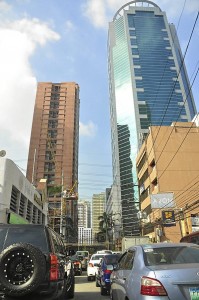Second in a series
First good news: Manila has just been upgraded in commercial investments prospects this year. Second good news: International property investors are not at all bothered by the ongoing impeachment trial proceedings in the Senate.
In an exclusive Web interview with Urban Land Institute trustee and South Asia chair Simon Treacy in the office of ULI Philippines founding chair Carlos Rufino on Dec. 14, 2011, he stated that he was aware of the showdown between Malacañang and the Supreme Court Chief Justice. He stressed that this political issue would not affect the perception of foreign property investors.
“In majority of countries, I think people look at these headlines every day, they look beyond that and people such as investors as well as these respondents are interested in the Philippines increasingly.”
Inquirer Property reported last week that the Philippines has been an increasingly important destination for property investments. Manila was upgraded in commercial investment prospects by two ranks in the Emerging Trends in Asia Pacific 2012 (a real estate forecast jointly published by the Urban Land Institute and PricewaterhouseCoopers).
Manila’s improvement—from the 20th to 18th for this year—was largely due to the expected continued growth in the gross domestic product of the Philippines.
“A new government and a surge in foreign investment in the business process outsourcing market—back office and call centers, for the most part—have helped the commercial real estate market, boosting the city’s 2012 investment prospects,” the report stated.
Covering 21 markets in the Asia Pacific, the Emerging Trends ranking is based on the opinions of more than 360 respondents composed of internationally renowned real estate professionals, including investors, developers, property company representatives, lenders, brokers and consultants.
Included in the 52-page report, however, has been the six-place slide of Manila in terms of development, falling to 17th in rankings.
Inquirer Property asked local property analysts their own take on the possible implications of the ongoing Senate impeachment trial, and their responses were mixed.
Enrique Soriano, a professor at the Ateneo Graduate School of Business and senior adviser at Wong+Bernstein Business Advisory, said that generally, the impeachment pro ceedings was a political and legitimate exercise and, therefore, should not in any way affect a country’s real estate ranking.
“However, for third-world and emerging economies like the Philippines where foreign direct investments, image and political stability play crucial roles in shaping the investment climate, the present impeachment (proceedings) against the CJ will likely have a direct impact on our real estate index,” Soriano said.
“Politics and business in this country are inextricably linked, and therefore a direct correlation exists. For foreign property investors, vectors of entry in a host country entail not just a full diagnostic of the economic picture but also a thorough understanding of the political risk index, both incumbent and future national complications,” he added.
Two sides
A NEW government and a surge in foreign investment, particularly in BPOs, have propped up the commercial real estate market and, consequently, the country’s investment prospects in 2012.
David Leechiu, country head of Jones Lang LaSalle, explained, “There are two sides to the coin here. The first side, if you look at the last 10, 12 years, despite all the political havoc we went through from the time of Presidents Estrada, Arroyo, with all the coup dé tats, rallies, bombings, the BPO (business process outsourcing) has flourished. Twelve years ago, there were a thousand employees in the BPO industry. Today there are about 620,000 people.”
He said, “There are some industries and some companies that have adapted to that. So we can say despite all our political problems, we’ve been fine in attracting these industries, but what is the cost? The cost is that our credibility as a political institution needs a lot of restoration, and so how the world will see this thing is going to depend on how we conduct ourselves and whether it will stand scrutiny from the international community.”
Liu Chui added: “Now if we have credibility, then what that will translate for us is that dramatic opening of the Philippines to the world. Because of our political situation, we have been one of the lowest recipients of world direct investments. Yes, the 12-year period hasn’t stopped the BPO industry from growing. The 12-year political strife has not stopped the overseas remittances from flowing, (but) it has come at a cost of foreign direct investment of progress.”
Photos by Tessa R. Salazar
